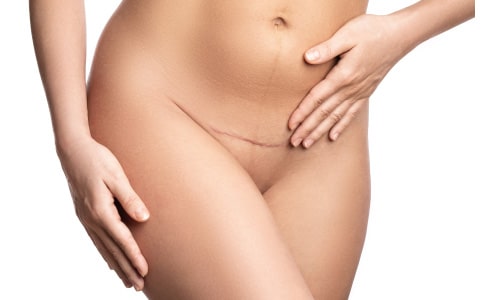7 Things to Expect After a Tummy Tuck
If you’re considering a tummy tuck, get ready to embrace a brand new body and brace yourself for the worst days after Tummy Tuck surgery. The recovery process can be intense and challenging, lasting several weeks. However, having a few essential pieces of information at your fingertips can make the healing period more manageable.
Here are seven things to expect after a tummy tuck:
1. YOU WILL EXPERIENCE SOME PAIN AFTER TUMMY TUCK, BUT THERE ARE WAYS TO MANAGE IT
Any invasive surgery comes with some pain, and tummy tucks are no exception. The surgery requires removing both fat and skin, and usually suturing the abdomen’s connective tissues as well, so that they hold together more tightly. All of this will cause pain, tightness and lack of mobility during the Tummy Tuck recovery period.
One option that your surgeon may offer you is a non-narcotic, non-opioid pain reliever called Exparel which is injected directly into the abdominal muscles, tissue and fascia during surgery. This long acting medication can reduce post operative pain for up to 72 hours. Exparel will add about $500 to the cost of the surgery, but the significant reduction in pain and increased comfort is well worth it for most patients.
Your surgeon will probably prescribe a strong prescription pain medication to manage the worst pain, typically felt during the first 3 days after surgery. You’ve likely heard of the opioid crisis, and it’s largely due to overuse of pain medications following injuries and surgeries. You should avoid opioids if you have a history of personal or family substance abuse. It’s also very important to take the pain medications exactly as prescribed, and to not take more than is necessary.
Typically your pain won’t be severe enough to require opioids for more than 3 days. As you heal and the pain becomes more manageable, you’ll be able to switch to an over-the-counter pain reliever. As long as you take your medications as instructed, you can minimize the discomfort you feel from a tummy tuck surgery so that it is tolerable.
2. YOU MUST WEAR YOUR COMPRESSION GARMENT
Following the surgery, your physician will put you in a garment this will help with the worst days after Tummy Tuck. This helps to constrict your abdomen, reducing swelling, promoting blood flow to the area as well as keeping everything in place during healing. While the garment may not be very comfortable, it’s critical you wear it for the full amount of time recommended by your doctor to aid in your recovery.
3. YOU WILL NEED TO TAKE YOUR MEDICATIONS DILIGENTLY
Physicians almost invariably prescribe antibiotics following surgery, even of the minor kind. That’s because the chances of infection increase following an invasive procedure, in which your body’s defenses are lowered due to open wounds. Antibiotics fight invading bacteria and reduce pressure on the immune system during your tummy tuck recovery, so it’s critical you take regular doses as prescribed.
This is especially important in the first week or two following the surgery, when infection and clotting are most likely. For that reason, depending on your medical history and if you are at a higher risk for blood clots, your physician may also prescribe an anticoagulant to make sure blood continues to flow freely through the area and supply you with healing nutrients.
Many doctors will give you your prescriptions ahead of time so that you already have them when you come home from your surgery. The same goes for pain medication, which you will need to begin taking the same day of the surgery.
4. RECOVERY CAN BE LONG, AND SOMETIMES FRUSTRATING

A tummy tuck surgery is a big surgery, as is a mommy makoever, so your main focus during the first two weeks should be on your self and your recovery. You will feel very tired and will want to sleep a lot, which is encouraged because your body heals when it rests. You’ll also need help doing the most simple tasks such as getting up and moving around, especially the first few days.
Despite this, you should try to maintain a reasonable level of movement while healing. You should try to walk every day to promote blood circulation and reduce your chances of developing a blood clot. As you start to regain some energy, you can ease back into simple tasks but avoid heavy lifting for 6 weeks. Listen to your body so that you don’t over-do it. The last thing you want to do is over-extend yourself and risk popping a suture.
Most tummy tuck patients can return to work after 2 to 3 weeks, and will be back to their normal energy levels by 5 to 6 weeks.
5. YOU WILL HAVE A SCAR
Many people worry about the tummy tuck scar. It’s true that you will end up with a lasting scar, just as you would with any incision. However, plastic surgeons endeavor to place this scar low enough on the abdomen so that it falls below the underwear line so that modest bikini bottoms and swim shorts will cover it. You may not be able to wear low-slung beachwear, but barring that, the incision will not be visible to others.
Although the final outcome of the scar is largely dependent on genetics and surgical technique, there are a few things you can do to minimize the appearance of the scar. Eating a nutritious high protein diet, using a scar therapy program such as Embrace, and protecting your scar from sun exposure are all things you can do to ensure that your incision heals in the best way possible.
6. YOU CANNOT SMOKE, OR YOU MIGHT HAVE ISSUES WITH HEALING
Many smokers don’t want to hear that they’ll need to limit their smoking, but it is imperative. Smoking decreases blood flow in your body, and that can be disastrous when healing after abdominal surgery. Your blood is what carries oxygen, nutrients and water to the injury site, helping it to knit together quickly with a minimum amount of scarring. Smoking, however, shuts down circulation and increases the chance of slow healing and tissue damage.
Therefore, you should plan to quit at least six weeks before your surgery and refrain from smoking during your recovery. Ideally, you can use this opportunity as motivation to quit completely. Some physicians will even refuse to do the surgery if they don’t feel you’re taking the smoking ban seriously, so wrap this into your pre-op preparations today.
7. YOU WILL NEED SUPPORT
Many people assume that they can “get around fine” after the first day or two of the surgery, but that’s not the case. Not only is a tummy tuck a major surgery, but you may not realize how much “heavy lifting” of daily movement that your abdominal muscles do. Once you have an incision in this area, every normal activity becomes more difficult. Movements such as reaching up high, sitting up, and even a cough or sneeze may be very uncomfortable indeed for several weeks.
That’s not to say you will need help during your entire recovery, but at a minimum, you should definitely arrange to have someone helping you for the first week after your surgery. You will need to help with child and/or pet care, making meals, getting in and out of bed, moving around your home, dressing and bathing. After about two weeks, you’ll be mostly back to your regular routine and able to finish your normal daily to-dos (except for exercise- you will need to wait 6 weeks to begin exercising again).
Despite the long recovery time and associated discomfort, 97% of those who have had a tummy tuck say it was worth it according to realself.com! With the right mindset and preparation, your tummy tuck experience should be relatively seamless and before you know it, you’ll be enjoying your flatter tummy and stronger core. Want to learn more?
QUESTIONS AND ANSWERS
HOW PAINFUL IS A TUMMY TUCK?
As with any surgical procedure, there is a degree of pain and discomfort associated with a tummy tuck surgery during the worst days after Tummy Tuck.
During the first few days post op, it is common to experience significant pain and discomfort, particularly in the abdominal area. Your surgeon will provide you with pain medication to help manage the pain, and you should plan to take some time off work to rest and recover.
In the weeks following the surgery, the pain and discomfort will gradually subside, but it is still essential to take things easy and avoid strenuous activities until your surgeon gives you the green light to resume normal activities. Your surgeon may also recommend wearing a compression garment for several weeks after the surgery to reduce swelling and promote healing.
It is worth noting that everyone’s pain tolerance is different, so what one person may find extremely painful, another person may find more tolerable. However, in general, a tummy tuck surgery is considered a significant surgical procedure, and some degree of pain and discomfort should be expected during the recovery period.
HOW LONG DOES PAIN LAST AFTER TUMMY TUCK?

During the first week after the Tummy Tuck procedure, you can expect to feel moderate to severe pain and discomfort, particularly in the abdominal area. Your surgeon will prescribe pain medication to help manage this discomfort, and you should take it as directed.
After the first week, the pain and discomfort will gradually begin to subside, and you will start to feel more like yourself again. However, it is not uncommon to experience some mild to moderate discomfort for several weeks to a few months following the surgery, as your body continues to heal.
To help manage pain and promote healing, your surgeon may recommend that you wear a compression garment for several weeks following the surgery. You may also be advised to avoid strenuous activities and heavy lifting for several weeks to allow your body to heal properly.
It is important to note that everyone’s recovery process is different, and some people may experience more or less pain than others. However, by following your surgeon’s post-operative instructions and taking care of yourself, you can help minimize pain and promote a smooth recovery.
What are the worst days after tummy tuck?
The worst days after a tummy tuck are typically the first few days after the surgery, as this is when you are likely to experience the most pain and discomfort. During this time, it is common to feel a significant amount of soreness and discomfort in the abdominal area, as well as fatigue and difficulty moving around.
In addition to the pain and discomfort, you may also experience some swelling, bruising, and stiffness in the abdominal area, which can make it difficult to get up and move around. Your surgeon will likely prescribe pain medication to help manage the discomfort, and you may need to take some time off work to rest and recover.
As the days and weeks following the surgery pass, you can expect the pain and discomfort to gradually subside, and you will start to feel more like yourself again. However, it is important to continue following your surgeon’s post-operative instructions and taking care of yourself to ensure a smooth recovery.
While the first few days after a tummy tuck can be challenging, it is important to remember that the discomfort is temporary, and the end result of the surgery is a flatter, smoother, and more toned-looking abdomen. By taking care of yourself during the recovery period, you can help ensure a successful and satisfying outcome.
SCHEDULE A CONSULTATION TODAY
Read Tummy Tuck recovery reviews and see Tummy Tuck before and after photos. Feel free to schedule a San Francisco tummy tuck procedure appointment today!




